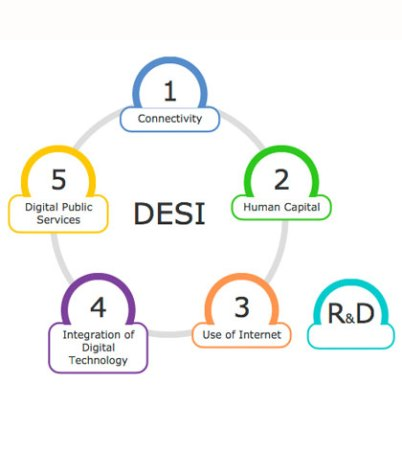The European Commission has just published the results of the 2017 Digital Economy and Society Index (DESI).
The DESI is a composite index that measures the progress made by the European Union member states towards a digital economy and society. It synthesizes a set of indicators covering connectivity (7 indicators); human capital (4 indicators); Internet use (7 indicators); digital technology integration (8 indicators) and digital public services.
The DESI index for the year 2016 records an increase of 3 points compared to last year for all 28 member countries: it goes from 49 to 52 points out of 100.
This average progress should not obscure the persistence of significant differences between Member States: the gap between the most advanced country in this area (Denmark) and the least advanced (Romania) is 37 points (compared to 36 in 2014).
Denmark, Finland, Sweden and the Netherlands have the best indices this year, followed by Luxembourg, Belgium, the UK, Ireland, Estonia and Austria. Slovakia and Slovenia are the EU countries that have made the most progress.
Connectivity is improving in the EU... but still insufficient to meet future needs.
76% of European households have access to very high speed broadband (at least 30 Mbps). In some Member States, a significant proportion of households already have access to networks capable of delivering speeds of 100 Mbps or more.The number of mobile data subscriptions is growing: from 58 subscribers per 100 inhabitants in 2013 to 84 in 2016.
4G mobile services cover 84% of the EU population.
This is not enough, observes the European Commission, "to meet the future increase in needs in terms of speed, quality and reliability of connections". Internet traffic is growing by 20% per year, and even by more than 40% per year on mobile networks.
The number of digital specialists in the EU is growing, but the skills gap persists
The EU has more science, technology, engineering and mathematics graduates than ever before (19 graduates per 1,000 people in the 20-29 age group).There are more ICT specialists in the workforce (3.5 percent in 2015 versus 3.2 percent in 2012).
Nearly half of Europeans (44%) still lack basic digital skills, such as using email, editing tools or setting up new devices.
79% of Europeans use the Internet at least once a week
A series of indicators show an increase in digital use in the Union:- 78% of Internet users play or download music, movies, photos or games.
- 70% of European Internet users read the press online (64% in 2013).
- 63% use social networks (57% in 2013).
- 66% shop online (61% in 2013).
- 59% use online banking (56% in 2013).
- 39% use the internet to make calls (33% in 2013).
European companies are making more use of digital technology
European companies are increasingly adopting digital technologies, such as business software for electronic information exchange (from 26% of companies in 2013 to 36% in 2015) or electronic invoicing (from 10% in 2013 to 18% in 2016).Online selling has also increased slightly among SMEs (from 14% of SMEs in 2013 to 17% in 2016). However, less than half of these companies sell to other EU member states.
Europeans are using more public services online.
34% of Internet users fill out administrative forms online rather than on paper (compared to 27% in 2013).Among the 28 Member States, France ranks 16th. It ranks 9th in the world.e It is, however, below the EU average for the integration of digital technologies by businesses, for connectivity, and for Internet use by individuals. It is, however, below the EU average in the integration of digital technologies by businesses, in connectivity and in the use of the Internet by individuals.
Références :
The DESI was developed by the European Commission (DG CONNECT) to assess the evolution of EU countries towards a digital economy and society. It consists of 30 indicators structured in five components: connectivity (7 indicators); human capital (4 indicators); internet usage (7 indicators); digital technology integration (8 indicators); digital public services (4 indicators). The DESI 2016 index has been recalculated for all countries to reflect some methodological improvements.





